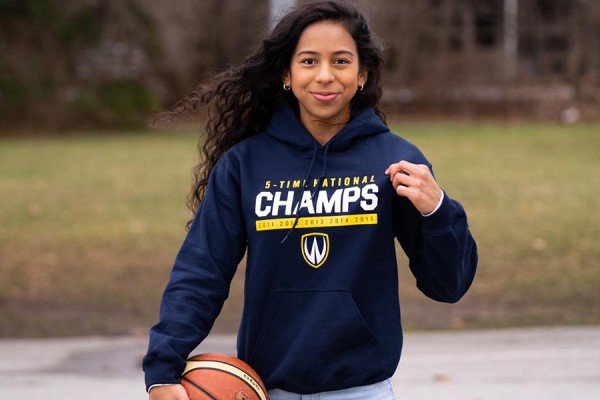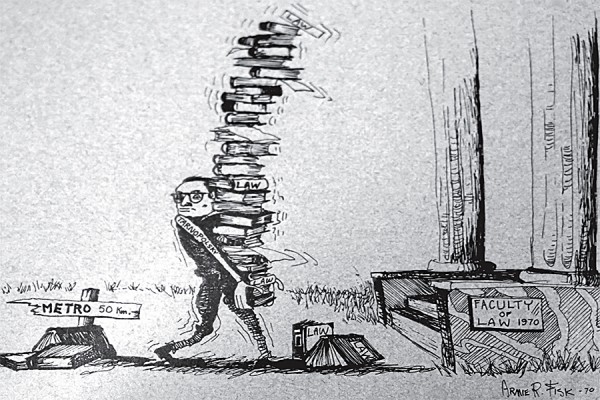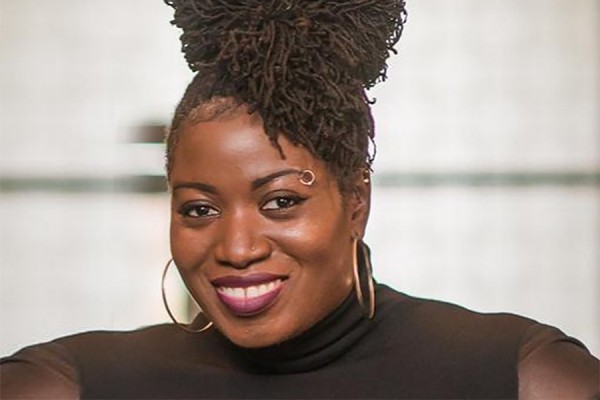Isabella Anés doesn’t remember a time when she didn’t play basketball.
The 19-year-old point guard started dribbling when she was 5. She began playing competitively in elementary school in her home country of Venezuela after her gym teacher recognized her natural talent and said she was coachable. The school then sent home a note to her parents asking their permission to have little Isabella play with much older students.
The note is all she remembers.
“They attached a little paper to my wrist, stapled like a bracelet.”
This fall, Anés will join the roster of the Lancer women’s basketball team, one of five new recruits for the upcoming season. She is enrolling in the Faculty of Human Kinetics and hopes to one day become a physiotherapist, a trainer, or a strength and conditioning coach.
Head coach Chantal Vallée says she sees a great future for Anés, both athletically and academically.
“She just floored me,” said Vallée of why she recruited Anés. “It’s not just her athletic ability. I was taken aback by her maturity, her IQ, her work ethic, everything. She bases herself on very solid values. She has goals and she knows what she wants in her life.”
Anés attends a private high school in Markham, Ont. that boasts a 100 per cent university placement rate for its graduates. Her average consistently hovers around 97 per cent.
She is the captain of her school team and plays on another basketball team sponsored by Under Armour. She played on Venezuela national teams and participated in the International Basketball Federation (FIBA) South American Championship in 2015 and 2016, and in the FIBA Americas championships in Argentina the following year. In 2014, she was named most valuable player of the XIV Edition of the Cup of Latin-American Clubs.
When this year’s season was sidelined by COVID-19, Anés began putting out training videos for her teammates. She expected a handful of them to join her in the workouts. Instead, they’re nearly all participating and clamouring for her to host more.
Her goal has always been to attend university “in the north” as she calls Canada and the United States. So, at 15, she left Venezuela and moved to Witchita, Kansas on her own. She found a private boarding school there that offered her a scholarship, and she started following her dream.
Her father, meanwhile, left Venezuela for Canada where her older brother was already attending college in the Toronto area. Her mother later followed them. Anés joined them in 2019 after securing a scholarship at the J. Addison School where she is now.
Her father, who has a university degree in computer science, and her mother, who was a university-educated data analyst for a resource company in Venezuela, work as janitors. Anés lives with them in a cramped two-bedroom apartment. Her parents have one room, her brother, the other.
Anés sleeps on the living room sofa.
“It’s OK,” she says. “It’s what I have to do.”
Her defining moment, she says, came in 2019. It was the first minute of the first game of a showcase tournament in Indianapolis when she felt a pop in her knee.
“I knew it was something severe, but I didn’t want to accept it.”
She returned to Canada and found a sports doctor who sent her for an MRI. She had torn her ACL and damaged her meniscus.
With no private insurance and as a newcomer to Canada not eligible for government health care, Anés needed to find a way to get the $15,000 surgery that would save her basketball career. Her coach started a GoFundMe account that quickly raised $5,000, and Anés did research to find a surgeon who agreed to take monthly payments for the balance. Her parents skimped and saved to pay for the operation and the months of physiotherapy that followed.
“It was a setback, but it wasn’t a curse,” said Anés. “I see it as a blessing.” She was in Canada with her family rather than still back in Kansas, alone, she says optimistically. She had the support of her coaches, teachers, and teammates.
“For me, it’s an example of how throughout my entire story, everything has been aligned perfectly with what God wants me to be and the people he wants me to be surrounded with.”
Anés was playing pick-up games at George Brown College when the coach of the opposing team approached her about joining the Lancers. That coach was one of Vallée’s assistants, Nambogga Sewali.
Anés was being courted by Division 1 schools in the United States. She agreed to talk to Vallée to keep her options open.
In their conversations, Vallée offered advice on the recruitment process. A year later, when some of the problems Vallée had warned her about began to transpire, Anés called for more advice.
“She seemed to really care about what happened to me,” Anés said of Vallée. That’s when Anés came to realization UWindsor is where she should be.
“I said, ‘Coach, if you open the door for me, I’ll take it.’”
Vallée says Anés is wise beyond her years and a born leader.
“I know she wants to bring the Lancer program to new heights and I will do my best to support her, our fantastic recruiting class, and the returning players to achieve this dream together.”
Anés recently posted a video on YouTube she calls “The Next Chapter.” In it, she thanks her parents, and her coaches, friends and teammates in Canada, the United States, and Venezuela. She pulls on a Lancer sweatshirt and triumphantly announces her decision to attend UWindsor.
She said she has come to the realization that Division 1 basketball is not what’s best for her.
“My priority is to go to a place that will shape me as a human being and let me reach my full potential both on and off the court.”
Of attending UWindsor, she says, “I feel nothing but grateful, blessed, and so happy.”
—Sarah Sacheli
 The Humanities Research Group will host author, academic, and activist Naomi Klein in cyber-conversation Tuesday, Jan. 26.
The Humanities Research Group will host author, academic, and activist Naomi Klein in cyber-conversation Tuesday, Jan. 26.




